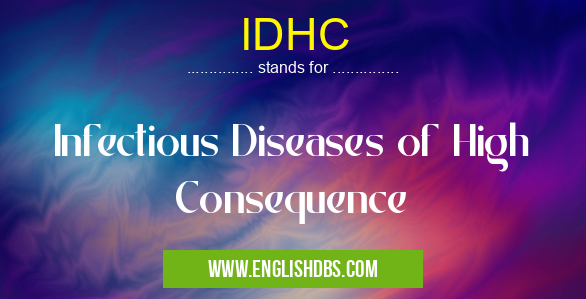What does IDHC mean in DISEASES
Infectious Diseases of High Consequence (IDHC) refers to the most severe infectious illnesses caused by agents with potential for public health impacts and serious morbidity. IDHCs include a broad range of pathogens such as viruses, bacteria, fungi, and parasites that cause severe illness or death among humans. These pathogens present significant challenges to the prevention and control of disease in populations. IDHCs are an ever-growing concern for public health authorities since they can spread quickly through several pathways and have high fatality rates if left untreated.

IDHC meaning in Diseases in Medical
IDHC mostly used in an acronym Diseases in Category Medical that means Infectious Diseases of High Consequence
Shorthand: IDHC,
Full Form: Infectious Diseases of High Consequence
For more information of "Infectious Diseases of High Consequence", see the section below.
What is IDHC?
IDHC is an acronym for Infectious Diseases of High Consequence. It refers to any infections that are deemed to be of great consequence within a population due to their potential to cause widespread morbidity, mortality or disruption of global social systems. This includes diseases such as SARS-CoV-2 (COVID-19), HIV/AIDS, pandemic influenza, tuberculosis, typhoid fever, malaria, hepatitis B and C, encephalitis, dengue fever and others. Generally speaking, these diseases are highly contagious or have long incubation periods making them difficult to contain in affected areas without proper management strategies including early detection and treatment.
How Can I Prevent IDHC?
The best way to prevent any infectious disease is through proper hygiene practices such as washing hands frequently with soap and water; avoiding contact with individuals who may be infected; avoiding exposure to potentially contaminated surfaces; practicing safe sex; getting all necessary vaccinations; and following other prevention guidelines outlined by the Centers for Disease Control (CDC). It is also important to stay up-to-date on local news concerning outbreaks so that you can take appropriate action should there be any warning signs in your area. Additionally, many countries offer free testing services for those in at risk communities which can help identify cases early on and reduce the spread of infection.
Essential Questions and Answers on Infectious Diseases of High Consequence in "MEDICAL»DISEASES"
What is an Infectious Disease of High Consequence?
An Infectious Disease of High Consequence (IDHC) is a communicable disease that poses a threat to public health due to its harmfulness, contagiousness and possibility for global spread. IDHCs can range from serious bacterial infections such as anthrax to more serious viral infections such as Ebola and Zika virus.
Who are at risk of developing infectious diseases of high consequence?
Those who come into contact with infected individuals or animal vectors are at the greatest risk for developing infectious diseases of high consequence. However, anyone could be susceptible to an IDHC if appropriate preventative measures are not taken.
How can I prevent infection with an Infectious Disease of High Consequence?
There are several steps you can take in order to lower your risk of developing an infectious disease of high consequence. Traveling to areas with known disease outbreaks should be avoided where possible. Ensure you maintain good hygiene practices, such as washing hands regularly. Avoid contact with wild animals or their secretions and limit close contact with those who may be infected.
What types of treatments might be available for IDHC's?
Treatment for an IDHC depends on the severity and type of illness it causes, but may involve antiviral drugs, antibiotics, antifungal medications or vaccines when available. In some cases supportive therapies including fluids and oxygen may also be necessary. All treatments should be administered under the guidance of a qualified medical professional.
How soon do symptoms typically appear after initial exposure?
Symptoms caused by IDHCs can vary depending on the specific disease but may appear anywhere from two days up to weeks or even months following initial exposure. Early detection is key in minimizing serious consequences so you should seek medical attention immediately if any associated symptoms occur.
Are there any long-term impacts after recovering from an Infectious Disease of High Consequence?
Yes, some people may experience long term consequences even after recovering from an IDHC such as chronic fatigue, joint pain or neurological issues. It's important for anyone who has recovered from an infectious disease of high consequence to continue receiving regular medical care post-recovery in order to monitor any potential complications.
Can Infectious Diseases Of High Consequence Be Transmitted From Mother To Baby During Pregnancy?
Yes, certain infectious diseases can pose a risk both during pregnancy and postpartum via mother-to-baby transmission. For example some viruses like Zika have been found in breast milk making it essential for mothers to receive adequate treatment during pregnancy if they have been exposed and/or infected.
Final Words:
In summary, Infectious Diseases of High Consequence (IDHC) are an important concern for public health authorities due their potential for severe consequences if left untreated or mismanaged. They require ongoing surveillance efforts in order monitor changes in incidence levels among populations as well as interventions targeted at preventing transmission between individuals in affected regions. In addition to prevention strategies mentioned above it is also important for individuals to stay informed about current outbreaks with news sources so that they may take quick steps towards protecting themselves if needed.
